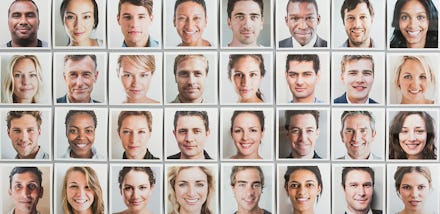Science Finds One Physical Feature We Should Stop Judging Each Other On

You may have been taught not to judge a book by its cover, but it turns out you already do a lot of judging based on a person's face.
A new study published in the journal Trends in Cognitive Sciences shows that people have preconceived notions about which personality traits are associated with different kinds of faces. We look at faces as a shortcut to judge everything from dominance to trustworthiness to sheer competence.
It's more than trivia, too. The authors of the study say these facial biases can have a profound effect on how we interact, whom we vote for and how people treat us.
Take a look:
Each row of that photo pertains to a certain attribute. Row A is competence, B is dominance, C is extroversion and D is trustworthiness. The middle face in each is the average, with the faces on the right being seen as above average in each category and the ones on the left deemed below average.
Consider the bottom row. According to the study, feminine faces are viewed as more trustworthy, as are happy faces. That smiling face on the right looks like someone you could lend money to, right? But that guy on the left — don't make eye contact if you see him walking toward you on the sidewalk. At least that's what study participants seemed to think.
These facial constructions were studied independent of age, race ethnicity and gender, meaning other biases were kept as far out of the research as possible.
Here's the thing: It may seem obvious, but the researchers found that there was no real link between what your face looks like and how you actually fare at a given attribute. CEOs with more "competent" faces, for instance, were no more successful at running businesses than CEOs who didn't.
But that hasn't stopped voters from preferring candidates who look more competent, and judges from being more lenient toward people who look more innocent. Even in your social circle, you're probably more likely to want to get to know people who look like the right side of that chart than people who look like the left side, even though the latter group might be a thousand times cooler, funnier and nicer.
We can learn a lot about someone from what their faces look like, the researchers say, but the danger comes in assuming we can figure out too much.
"Although we would like to think our judgments and choices are rational, impartial, consistent and solely based on relevant information, the truth is that they are often biased by superficial and irrelevant factors," lead author Christopher Olivola told MedicalXpress.
"This is a troubling human tendency that needs to be corrected, or at least mitigated, because faces are not valid predictors of a person's traits."